What Is the Best Burger Internal Temp?
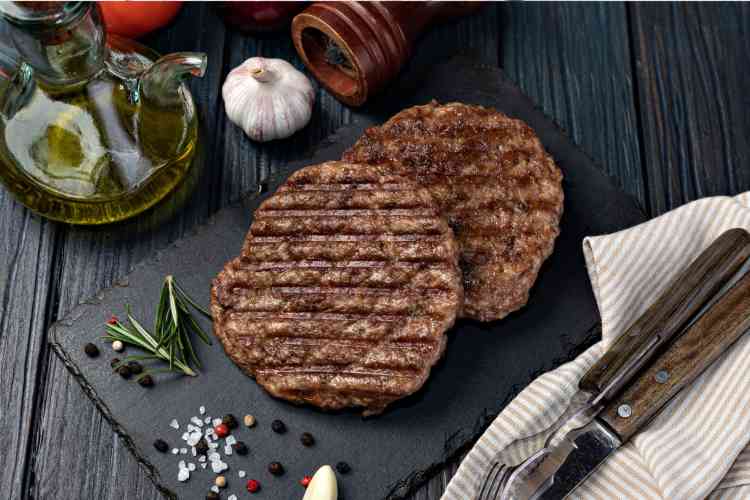
No matter what your preference is, to cook the perfect burger, you need to know the ideal burger's internal temp. A burger's temperature is often referred to as the “doneness.” Some people may like their burgers rare while others prefer them well-done. While there are plenty of opinions on the perfect doneness, or the ideal burger internal temp, there is a recommended temperature at which all burgers should be cooked.
The minimum internal temperature is meant to destroy any bacteria that may be harmful or cause foodborne illness. Cooking a burger is often an art form, but understanding how to do it to the right internal temperature can help you master it. So, whether you like it a little pink or without any pink at all, if you know the ideal internal temp, you’ll be able to cook the perfect burger every single time.
- Minimum Internal Temp of a Burger
- Best Internal Burger Temp
- Burger Internal Temp Chart
- How To Measure a Burger's Internal Temp
- Learn To Cook Burgers With Confidence in a Cooking Class
Minimum Internal Temp of a Burger
A burger's internal temp isn’t only about preference for doneness; it’s also about ensuring the burger is safe to eat. The recommended minimum temperature for ground beef burgers is 160°F. This temperature is considered well-done and presents the lowest risk of transmitting foodborne illness. For children, the elderly, pregnant women and those who are immuno-compromised, a 160°F temperature is recommended.
However, burgers can be cooked to a lower internal temperature to reach desired doneness. 125°F is the minimum recommended for a rare burger, but other meats may require different internal temperatures. For example, ground turkey or chicken burgers should be cooked to a minimum of 165°F.
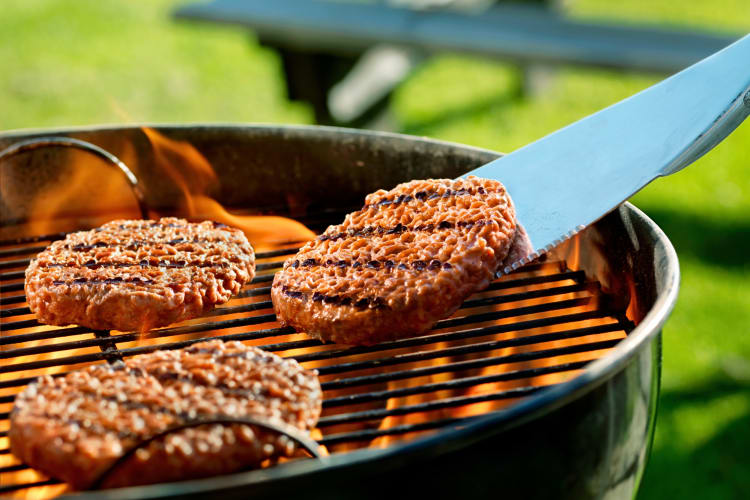
Best Internal Burger Temp
What is considered the best burger's internal temp is often a matter of preference. While there is a minimum recommended temperature, each level of doneness has a different internal temperature that should be reached. When it comes to beef, burgers can range from rare, which has the lowest internal temperature, to well done, which has the highest. Each level of doneness in between has a minimum level of doneness, too.
The best internal temp also depends on the type of meat the burger is made of. Meats similar to beef like venison and bison can be cooked to various temperatures for a desired level of doneness. However, meats like poultry and pork only have one recommended level of doneness and should be cooked to that minimum temperature.
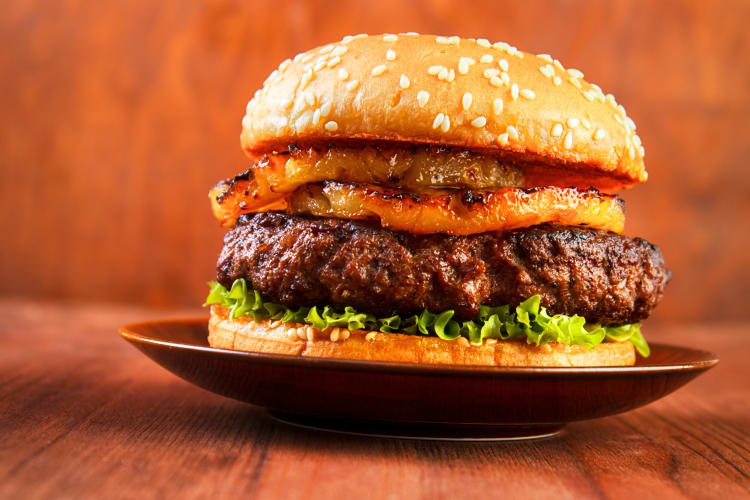
Beef Burger Internal Temp
- Ideal Internal Temperature: 160°F
- Best Cooking Method: On the grill
The ideal burger's internal temp for beef is 160°F, which creates a well-done burger that presents the least risk of foodborne illness. Grilling a burger provides a juicy and tender patty in just a few minutes. You’ll want to make a patty a bit larger than the bun and press a small indentation in the center before putting it on the grill.
Cook the burger for about four minutes on one side before flipping and cooking for another four minutes. Since burgers continue to cook after being taken off the grill, cook to an internal temperature of 155°F before removing from the heat.
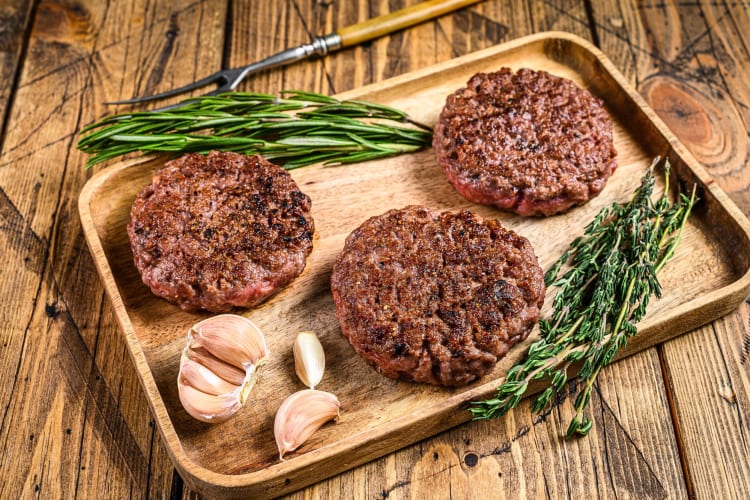
Turkey Burger Internal Temp
- Ideal Internal Temperature: 165°F
- Best Cooking Method: On the grill or in a pan
A turkey burger's internal temp should always be 165°F. Cooking to this turkey internal temp destroys bacteria that can cause foodborne illness. Grilling or pan-frying a turkey burger gives it that sear on the outside with a tender center. Cook the turkey patties for about five minutes on each side.
The outside should be golden brown and the center should be cooked through. For a healthier option, make air fryer turkey burgers — set the temperature to 360°F, cook the patties for seven minutes, flip them, then cook for five more minutes.
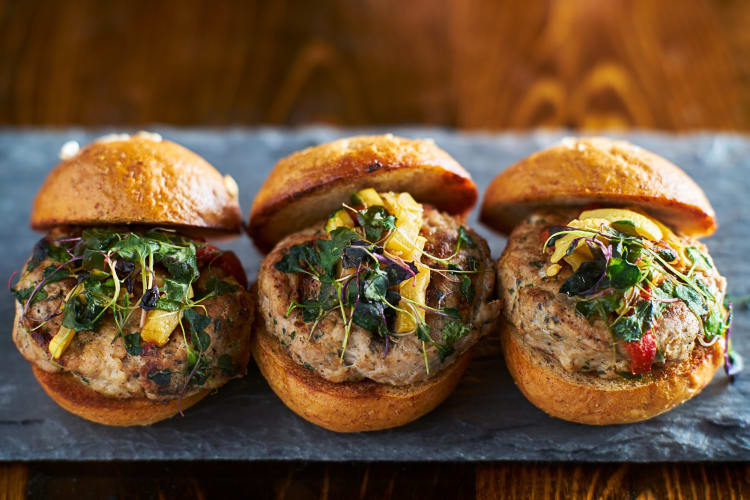
Salmon Burger Internal Temp
- Ideal Internal Temperature: 145°F
- Best Cooking Method: On the grill or in a pan
The FDA recommends an ideal salmon burger internal temp of 145°F to ensure the fish is done and reduce the risk of foodborne bacteria. However, while 145°F is the ideal and recommended temperature, this can often lead to a fish that’s too dry because of its lack of collagen. For the flaky and soft texture most people like from salmon, an internal temperature of 125°F is recommended.
Cook the salmon patties on the grill for about four minutes on each side, or until the interior temperature reaches 115°F. Remove from the heat and allow the burgers to rest for about five minutes before serving, allowing the temperature to rise to 125°F.
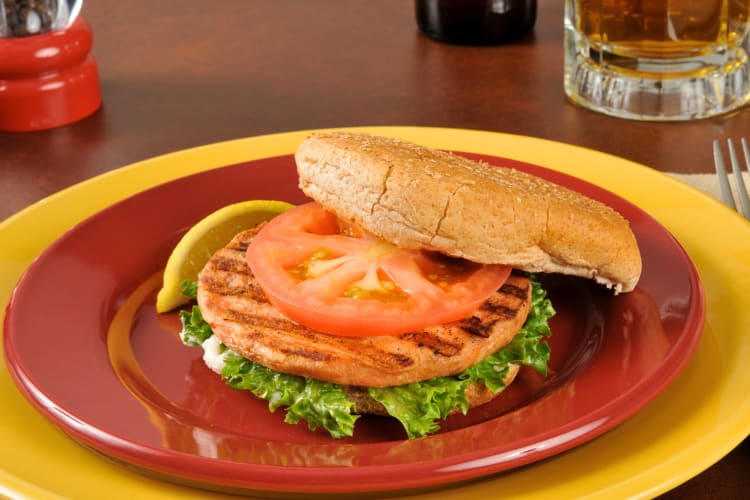
Pork Burger Internal Temp
- Ideal Internal Temperature: 160°F
- Best Cooking Method: On the grill or pan-fried on a stovetop
A pork burger's internal temp is similar to beef, with 160°F being considered well done, which is the ideal and recommended temperature. However, like beef, pork can be cooked to a lower internal temperature for varying degrees of doneness. Cooking pork to 145°F gives you a medium burger with a slightly pink center. Pork burgers can be cooked on the grill or pan-fried over medium heat.
Cook for four to five minutes on each side until the internal temperature reaches 160°F.

Bison Burger Internal Temp
- Ideal Internal Temperature: 160°F
- Best Cooking Method: Cast iron pan on the stovetop
A bison burger's internal temp should ideally be 160°F to reduce foodborne bacteria. However, similar to beef, they can be cooked to a lower internal temperature to achieve the desired doneness, such as 130°F for medium or 120°F for rare. Heat a cast iron skillet at medium-low temperature on the stovetop.
Cook the patties slowly to retain the juiciness throughout. Remove the patties once they reach 10 degrees below the desired temperature to prevent the burger from overcooking.
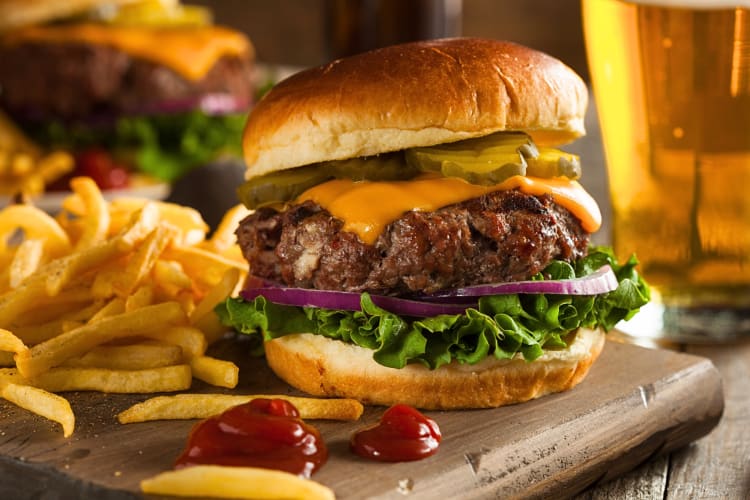
Venison Burger Internal Temp
- Ideal Internal Temperature: 160°F
- Best Cooking Method: Pan-fried on a stovetop
The recommendation for a ground venison burger's internal temp is 160°F, to prevent ingesting harmful bacteria. However, venison can dry out at this temperature, so the patties should ideally be cooked with beef, pork or egg to help retain some moisture. You can also cook to a lower internal temperature, for example, 145°F for medium doneness, to keep it juicy.
Fry in a cast iron skillet on the stovetop over medium-low heat so that the meat cooks slowly. Remove when the internal temperature is 10 degrees below the target and allow the meat to rest and finish cooking. Doing this prevents overcooking.

Chicken Burger Internal Temp
- Ideal Internal Temperature: 165°F
- Best Cooking Method: On the grill
It’s essential to let a chicken burger's internal temp reach 165°F when cooking. Undercooked chicken has a high chance of resulting in foodborne illness and food poisoning. Unlike beef, there are no varying degrees of doneness for chicken; all chicken should be served well-done.
Medium-high direct heat from a grill is the best way to cook a chicken burger; six to seven minutes on each side should ensure the burgers are cooked through. Remove them from the grill when the internal temperature is 160°F and allow them to rest to prevent the burgers from drying out.

Burger Internal Temp Chart
While there is a recommended burger internal temp, 160°F is not the only option to cook a burger at. To achieve the different levels of doneness from rare to well-done, you have to cook a burger at different temperatures. Below, we'll take a look at the various temperatures needed to reach the varying levels of doneness.
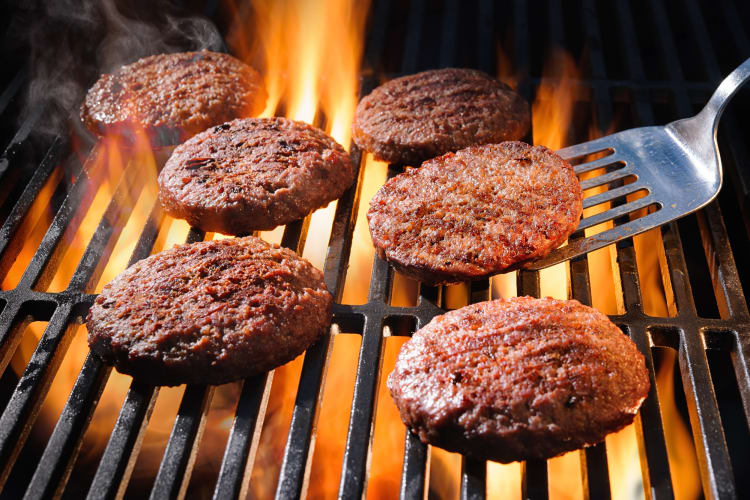
Internal Temp for a Rare Burger
The burger's internal temp should be between 120 and 125°F to achieve a rare doneness. To get to this internal temp of a burger, you only need to cook it for about four minutes. Rare burgers are soft with a mostly red center and a seared, light brown exterior.
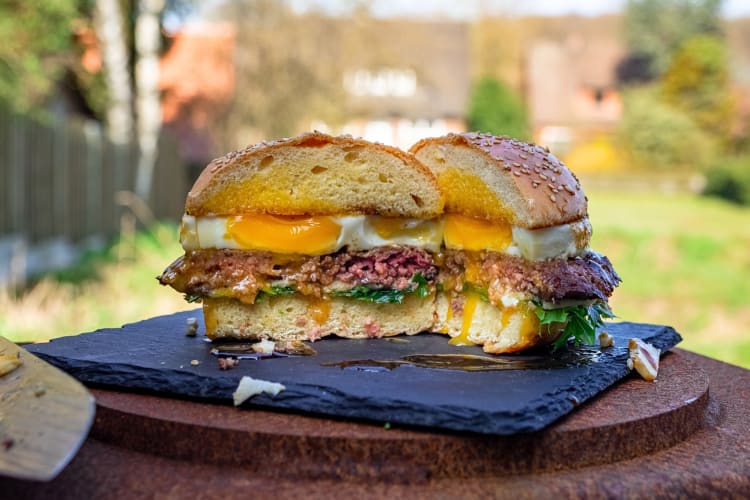
Internal Temp for a Medium-Rare Burger
For medium-rare doneness, cook until the burger's internal temp reaches 130 to 135°F. Medium-rare burgers cook for about five minutes total. The centers are a little less red than rare burgers and are more firm in texture.

Internal Temp for a Medium Burger
The internal temp for a medium burger should be between 140 and 145°F. Achieving this usually takes about six to seven minutes of total cooking time. The center of a medium burger is light pink and the exterior is a seared brown. They have a firm, yet springy texture.
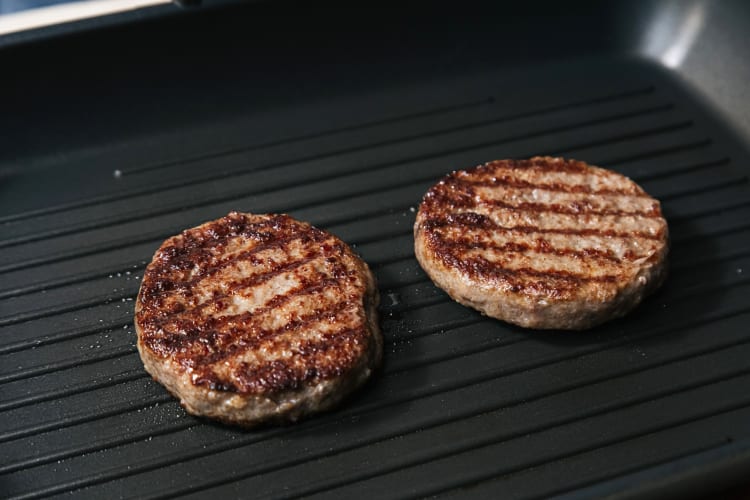
Internal Temp for a Medium-Well Burger
A medium-well burger's internal temp should be between 150 and 155°F. To achieve this burger's internal temp, cook the patties for about seven to eight minutes in total. A medium-well burger will have only a little pink in the center with a firm texture.
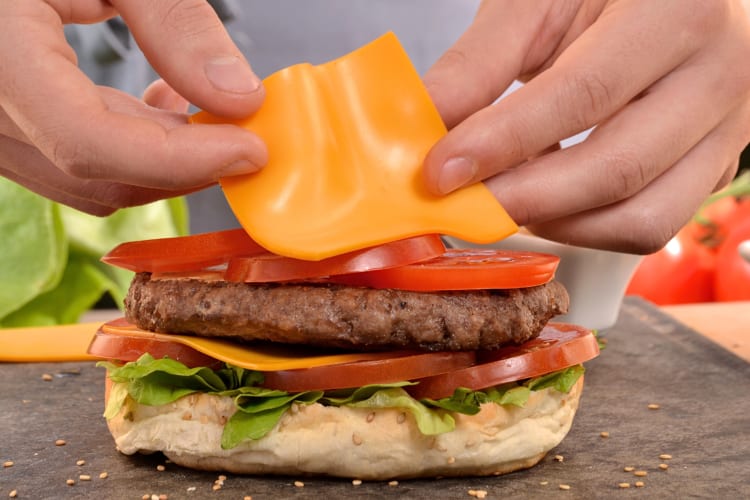
Internal Temp for a Well-Done Burger
A well-done burger's internal temp is 160°F or more. These burgers take between eight and nine minutes total to finish cooking. The center of a well-done burger is completely brown with absolutely no pink and it has a very firm texture.
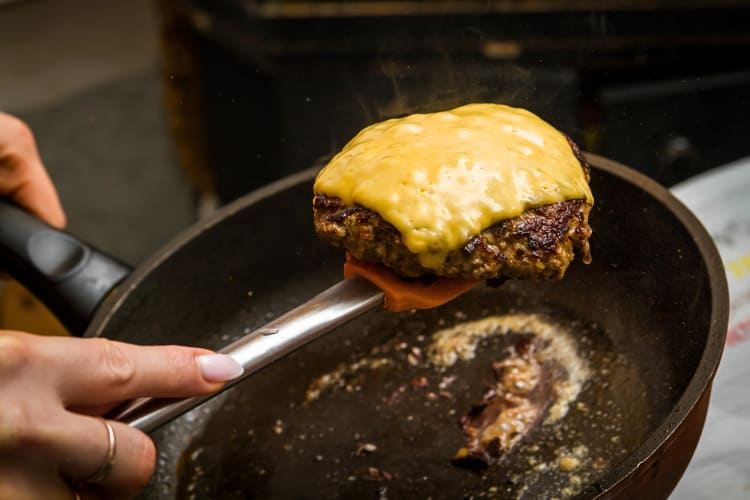
How To Measure a Burger's Internal Temp
Since burger internal temps are so important, it’s essential to be as accurate as possible. The best way to accurately check burger internal temps is to use a meat thermometer like the Harold Import Co. Thermometer.
Insert the tip into the thickest area of the patty, as close to the center as possible. Hold it steady until you get the result. You may want to check multiple areas of the patty to ensure the burger is cooked all the way through. Keep your meat thermometer away from heat sources to ensure the most accurate readings when it is not in use. Once you’re finished with the meat thermometer, wash it thoroughly with hot water and soap.
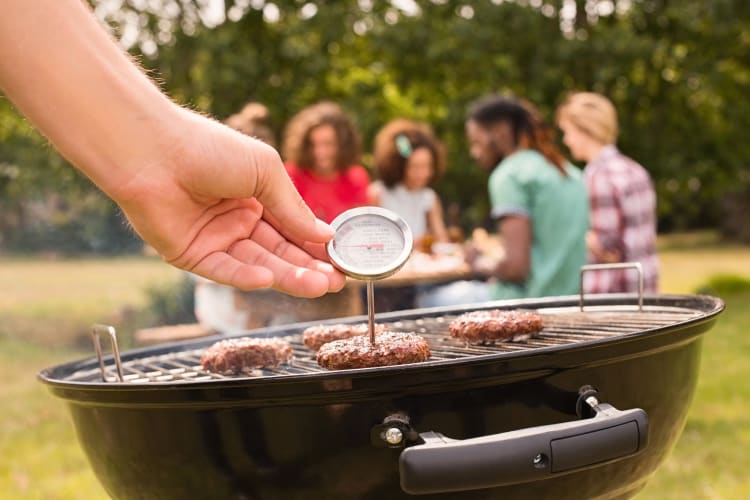
Learn To Cook Burgers With Confidence in a Cooking Class
Learn to cook the perfect burger every time thanks to cooking classes near you. Taught by professional chefs, you can opt for in-person classes or online cooking classes to master the art of the ideal doneness. You’ll learn recipes to make them flavorful and juicy, as well as secrets to creating a burger that will have everyone’s mouths watering.
Plus, you'll also get to practice other essential skills, like chopping vegetables for toppings and sides and making sauces to complement your burger. Book today and master flavors from around the world to infuse into new, creative burgers.

Learning to cook the perfect burger will ensure you get your ideal bite every time. Refer back to this temperature guide to always get your desired doneness. A meat thermometer will be a useful tool in the kitchen to elevate your burgers and by using one in conjunction with the above information, not only will your patties taste good, but they will also meet the safety standards required to avoid illnesses. Juicy, flavorful burgers are just a flip away.
For even more ways to explore your favorite foods, check out other experiences happening on Cozymeal.
